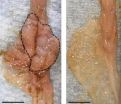(Press-News.org) PITTSBURGH, March 4, 2014 – Eating fish in amounts comparable to those of people living in Japan seems to impart a protective factor that wards off heart disease, according to an international study funded by the National Institutes of Health (NIH) and led by the University of Pittsburgh Graduate School of Public Health.
Middle-aged Japanese men living in Japan had lower incidence of coronary artery calcification, a predictor of heart disease, than middle-aged white men living in the United States, likely due to the significantly higher consumption of omega-3 fatty acids found in fish. The findings will be published in the March 6 issue of the journal Heart.
"Multiple studies have looked at the effect of fish oil on cardiovascular health, with mixed results," said lead author Akira Sekikawa, M.D., Ph.D., associate professor of epidemiology at Pitt Public Health. "Previous studies investigated substantially lower intake of omega-3 fatty acids than what people in Japan actually get through their diet. Our study seems to indicate that the level of marine-derived omega-3 fatty acids consumed must be higher than previously thought to impart substantial protection."
Marine-derived omega-3 fatty acids, which are found in fish, especially oily fish, as well as in squid and krill, may help to reduce inflammation and slow the formation of fatty plaques in arteries.
Researchers at Pitt partnered with scientists in Japan, Hawaii and Philadelphia to follow nearly 300 men for five years, tracking multiple factors that affect cardiovascular health, including cigarette smoking, the level of cholesterol in the blood and alcohol consumption, as well as their rates of diabetes and high blood pressure.
After accounting for risk factors for heart disease, the U.S. men had three times the incidence of coronary artery calcification as the Japanese men. Meanwhile, the levels of marine-derived omega-3 fatty acid in the blood were more than 100 percent higher in the Japanese than in the white men.
"The vast difference in heart disease and levels of marine-derived omega-3 fatty acid are not due to genetic factors," said Dr. Sekikawa. "When we look at Japanese Americans, we find that their levels of coronary artery calcification are actually higher than that of the rest of the U.S. population."
The average dietary intake of fish by Japanese people living in Japan is nearly 100 grams each day, which the American Heart Association considers 1 ½ servings. The average American eats about 7 to 13 grams of fish a day, or about one serving a week.
Heart disease is the leading cause of death in the U.S. and globally, according to the World Health Organization. However, Japan bucks this trend, with cancer as the leading cause of death.
"I am not encouraging Americans to start consuming massive amounts of fish, which may have harmful contaminants, such as mercury, in their flesh," said Dr. Sekikawa. "However, our findings indicate that it is worthwhile to take another look at the effect of marine-derived omega-3 fatty acids on heart disease, particularly when consumed at higher rates than previously investigated."
INFORMATION:
Additional co-authors on this study are Sunghee Lee, Ph.D., Rhobert W. Evans, Ph.D., Kim Sutton-Tyrrell, Ph.D., Marnie Bertolet, Ph.D., Emma J.M. Barinas-Mitchell, Ph.D., and Lewis H. Kuller, M.D., Dr.P.H., all of Pitt Public Health; Katsuyuki Miura, M.D., Ph.D., Akira Fujiyoshi, M.D., Ph.D., M.P.H., Takashi Kadowaki, M.D., Ph.D., Sayaka Kadowaki, M.D., Ph.D., Tomonori Okamura, M.D., Ph.D., Aya Kadota, M.D., Ph.D., Hirotsugu Ueshima, M.D., Ph.D., and Hiroshi Maegawa, M.D., Ph.D., all of Shiga University of Medical Science in Japan; Daniel Edmundowicz, M.D., of Temple University; Kamal H. Masaki, M.D., and Bradley J. Wilcox, M.D., both of the University of Hawaii; Yasuyuki Nakamura, M.D., Ph.D., of Kyoto Women's University; and Todd B. Seto, M.D., of Queen's Hospital in Hawaii.
This research was supported by NIH grants HL068200, HL071561, UL1RR024153 and UL1TR00005; and Japanese Ministry of Education Culture, Sports, Science and Technology grants B 16790335 and A 13307016, 17209023 and 21249043.
About the University of Pittsburgh Graduate School of Public Health
The University of Pittsburgh Graduate School of Public Health, founded in 1948 and now one of the top-ranked schools of public health in the United States, conducts research on public health and medical care that improves the lives of millions of people around the world. Pitt Public Health is a leader in devising new methods to prevent and treat cardiovascular diseases, HIV/AIDS, cancer and other important public health problems. For more information about Pitt Public Health, visit the school's Web site at http://www.publichealth.pitt.edu.
http://www.upmc.com/media
Contact: Allison Hydzik
Phone: 412-647-9975
E-mail: HydzikAM@upmc.edu
Contact: Wendy Zellner
Phone: 412-586-9771
E-mail: ZellnerWL@upmc.edu END
High consumption of fish oil may benefit cardiovascular health, Pitt public health finds
2014-03-04
ELSE PRESS RELEASES FROM THIS DATE:
Long-term study confirms success of method for detecting spread of deadly skin cancer
2014-03-04
Research at UCLA on a technique for detecting the earliest spread of melanoma, the deadliest form of skin cancer, has confirmed that the procedure significantly prolongs patients' survival rates compared with traditional "watch and wait" techniques.
The technique, which combines lymphatic mapping and sentinel-node biopsy, allows doctors to quickly determine whether the disease has spread, or metastasized, to the lymph nodes, which occurs in approximately 20 percent of patients. Patients with cancer in their lymph nodes may benefit from having their other nearby lymph ...
Light zaps viruses: How photosensitization can stop viruses from infecting cells
2014-03-04
A UCLA-led team of researchers has found evidence that photosensitizing a virus's membrane covering can inhibit its ability to enter cells and potentially lead to the development of stronger, cheaper medications to fight a host of tough viruses.
The UCLA AIDS Institute study, published in the February issue of the Journal of Virology, is part of ongoing research on a compound called LJ001, a "broad-spectrum" antiviral that can attack a wide range of microbes.
The current paper advances the science by showing that the process of photosensitization — heightening a ...
A highly sensitive small molecule probe to evaluate potential risk for Parkinson's disease
2014-03-04
A team of researchers from National University of Singapore (NUS) have created the first two-photon, small molecule fluorogenic probe that can serve as a useful tool for the rapid assessment of an individual's potential risk for Parkinson's disease. The highly sensitive fluorescence probe can detect with high precision the activity of Monoamine Oxidase B (MAO-B), an enzyme that is found in elevated levels in patients with Parkinson's disease. This innovation paves the way for the development of less costly non-invasive technologies and devices to help monitor the risk and ...
Immune system-based therapy produces lasting remissions in melanoma patients
2014-03-04
BOSTON – A drug that unleashes the immune system to attack cancer can produce lasting remissions and hold the disease in check – for more than two years, in some cases – in many patients with advanced melanoma, according to a new study by researchers at Dana-Farber Cancer Institute, Johns Hopkins University, Yale University, and allied institutions.
The study, published online today, March 3, by the Journal of Clinical Oncology, provides the longest-term look so far at how melanoma patients have fared since receiving the drug, nivolumab, in a phase I clinical trial. The ...
Every step you take
2014-03-04
Artificial photosynthesis, in which we emulate the process used by nature to capture energy from the sun and convert it into electrochemical energy, is expected to be a major asset in any sustainable energy portfolio for the future. Artificial photosynthesis offers the promise of producing liquid fuels that are renewable and can be used without exacerbating global climate change. A key to realizing commercial-scale artificial photosynthesis technology is the development of electrocatalysts that can efficiently and economically carry out water oxidation reaction that is ...
Eliminating bacteria, changing lifestyle could lower risk in people genetically susceptible to color
2014-03-04
New York, NY— Bacteria in the gut are essential for the development of intestinal tumors in mice, according to research led by investigators from the Icahn School of Medicine at Mount Sinai. Removing the bacteria may play a critical role in reducing cancer risk, the researchers write, in the March issue of the Journal of Experimental Medicine.
Sergio A. Lira, MD, PhD, Director of the Immunology Institute, and Professor of Immunology and Medicine, and his laboratory at the Icahn School of Medicine at Mount Sinai, used a transgenic mouse model to test the hypothesis that ...
Voters using smartphones made fewer errors in mock election
2014-03-04
Voters who cast their ballots via smartphones made fewer errors than they did when voting via traditional methods in a mock election, according to new research from psychologists at Rice University.
In a first-of-its-kind study, co-author Rice Professor of Psychology Michael Byrne examined how smartphone-based voting systems can be incorporated into the current large-scale voting process. The study, "Toward More Usable Electronic Voting: Testing the Usability of a Smartphone Voting System," found that while there are no consistent differences in efficiency and perceived ...
Native American city on the Mississippi was America's first 'melting pot'
2014-03-04
CHAMPAIGN, Ill. — New evidence establishes for the first time that Cahokia, a sprawling, pre-Columbian city situated at the confluence of the Missouri and Mississippi rivers, hosted a sizable population of immigrants.
Cahokia was an early experiment in urban life, said Thomas Emerson, who led the new analysis. Emerson is Illinois state archaeologist and the director of the Illinois State Archaeological Survey at the University of Illinois.
Researchers have traditionally thought of Cahokia as a relatively homogeneous and stable population drawn from the immediate area, ...
Researchers discover how soils control atmospheric hydrogen
2014-03-04
Researchers at New Zealand's University of Otago are helping to clear up an enduring mystery regarding the composition of the Earth's atmosphere. They have discovered the microbial soil processes that help ensure that the explosive gas hydrogen remains at trace levels.
In recent decades it was found that around four-fifths of all hydrogen released into the air is rapidly removed through soil activity, but exactly what is recycling it, and how, has remained unclear.
Now, Otago scientists have shown that the soil bacterium Mycobacterium smegmatis uses two special enzymes ...
Increased intake of fish can boost good cholesterol levels
2014-03-04
Increasing the intake of fatty fish increases the number of large HDL particles, according to a recent study completed at the University of Eastern Finland. People who increased their intake of fish to a minimum of 3–4 weekly meals had more large HDL particles in their blood than people who are less frequent eaters of fish. Large HDL particles are believed to protect against cardiovascular diseases. The results were published in PLOS ONE.
The consumption of fish has long been know to be beneficial for health; however, the mechanisms by which fats and other useful nutrients ...


